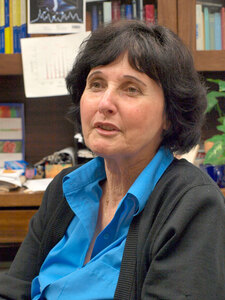Chemistry professor honored for mentorship
When Hanna Reisler began studying physical chemistry in college, she had no intention of re-entering the classroom. Thirty years and a change in career path later, she has been named the recipient of the second annual Provost’s Mentoring Award for her contributions to USC.

Mentor · Chemistry professor Hanna Reisler began working at USC in 1977 and began teaching in 1987. In 2007, she earned the Mellon Mentoring award. - Sunil Murali | Daily Trojan
“It’s ironic. The original idea was seeing myself working in a lab, not teaching,” said Reisler, a professor of chemistry in the USC College of Letters, Arts & Sciences. “I realized you can combine them, and it turned out to be the best of both worlds.”
Reisler grew up in Israel, where she completed her undergraduate and graduate studies and worked as a physical chemist until 1977.
“I was always interested in why things work the way they do — not making new materials but understanding reactions and using mathematics and physics to explain them. I did my master’s in organic chemistry, but I found myself asking other questions,” she said. “For my Ph.D., I switched to physical chemistry.”
Reisler moved to the United States in 1977 and joined USC as a research scientist.
Ten years later, she began teaching and is now helping others get involved in teaching as well.
“We had many discussions about how, as post-[doctorates], there wasn’t much opportunity to get experience teaching,” said Andrew Mollner, who has worked with Reisler on post-doctorate research since 2008. “She led a push for that to happen in the chemistry department, and this year they introduced the Burg teaching fellowships.”
Twenty years into her teaching career, in 2007, Reisler received the Mellon Mentoring Award, and in 2009 she was nominated for the Provost’s Mentoring Award.
“[Reisler] has been an exceptional model for junior faculty as well as for students and post-docs, particularly those who are women,” said Department of Chemistry Chair Charles McKenna, who wrote a letter supporting Reisler’s nomination. “Mentors should lead by example, and she has done so with her own academic career.”
Reisler works with students at all levels — from freshmen to post-doctorate students.
“I really like to teach freshmen because these are people in transition,” she said. “They go from high school to a very different system. We want to make them independent thinkers, and that’s something that is very satisfying to me.”
Though she works with a large variety of students, Reisler makes a point of individualizing her advice and mentoring students when they need to be pushed.
“Of all the people I’ve worked with, she’s the best at getting to know the people working for her,” Mollner said. “It’s a testament to her caring that she doesn’t treat everybody the same. She encourages them when they need to be encouraged and pushes them when they need to be pushed. She’s great at personalizing her interactions.”
Beyond her teaching, Reisler is an internationally renowned researcher published in more than 160 journals. She also established the Women in Science and Engineering program and has been involved in other programs aimed at enhancing involvement in science.
“Besides one-on-one mentoring, she’s also creating structures to mentor future students,” McKenna said.
Ten years ago, she established the WiSE program to encourage female participation in traditionally male-dominated fields.
The program, which began with an anonymous $20 million donation, provides research fellowships and child-care resources for undergraduate, graduate and post-doctorate students. Participants meet once a month as an informal networking group.
Reisler also mentors for the Female Undergraduates Educating and Leading in Science program and serves as head of the chemistry department’s graduate student advisory committee. She helped to set up the interdisciplinary Program in Drug Discovery, an organization to help graduate students interested in medicinal chemistry.
In addition to her research and involvement in student programs, Reisler is currently the Lloyd Armstrong Jr. Chair for Science and Engineering, and she teaches Advanced General Chemistry for incoming students.
Despite being known as a “mentor extraordinaire” by her students and fellow faculty, Reisler lacked a similar role model during her studies in Israel.
“Those were very different times,” she said. “I went for my entire undergraduate career without ever talking to a teacher or going to office hours. We didn’t have mentors, but we, the students, helped each other.”
She has, however, fully embraced her title as a mentor at USC.
“She’s an outstanding teacher with an incredible passion for mentorship,” said McKenna of Reisler. “She has made enormous contributions on multiple fronts, as a scientist, educator, mentor, administrator and model.”
Reisler responds to this with characteristic modesty.
“Being a mentor is a two-way street. You talk to people, and you learn from them,” she said. “[The award] means the university recognizes that that’s a very important part of the culture at USC. I’m just a representative of the larger group of people who are doing it.”
